Editor Note: This article originally appeared on the Tractor Zoom blog on April 4, 2025 is is being republished with permission.
On April 2, President Trump announced a sweeping 10% tariff on all countries, with additional reciprocal tariffs aimed at nations with which the U.S. has significant trade deficits. The move has stirred considerable conversation across political, economic, and agricultural circles. Our Tractor Zoom team wanted to cut through the noise and focus on how these tariffs may affect the used equipment market. So we turned to the true experts — our dealer network.
Through a rapid-response survey, we gathered insights from dealership professionals across the country, covering everything from anticipated changes in demand and pricing to broader dealership sentiment. Here's a breakdown of what we learned.
General Dealer Sentiment: Concerned, but Not Yet Alarmed
The first thing we wanted to understand was how concerned dealers were about the impact of tariffs. On a scale of 1 to 5 (with 5 being very concerned), the most common response was 4. Roughly 40% of respondents landed here – indicating a strong, but not panicked, level of concern. Interestingly, this concern level remained consistent across dealership roles, from ownership to frontline sales, suggesting a shared outlook on the implications of tariffs.
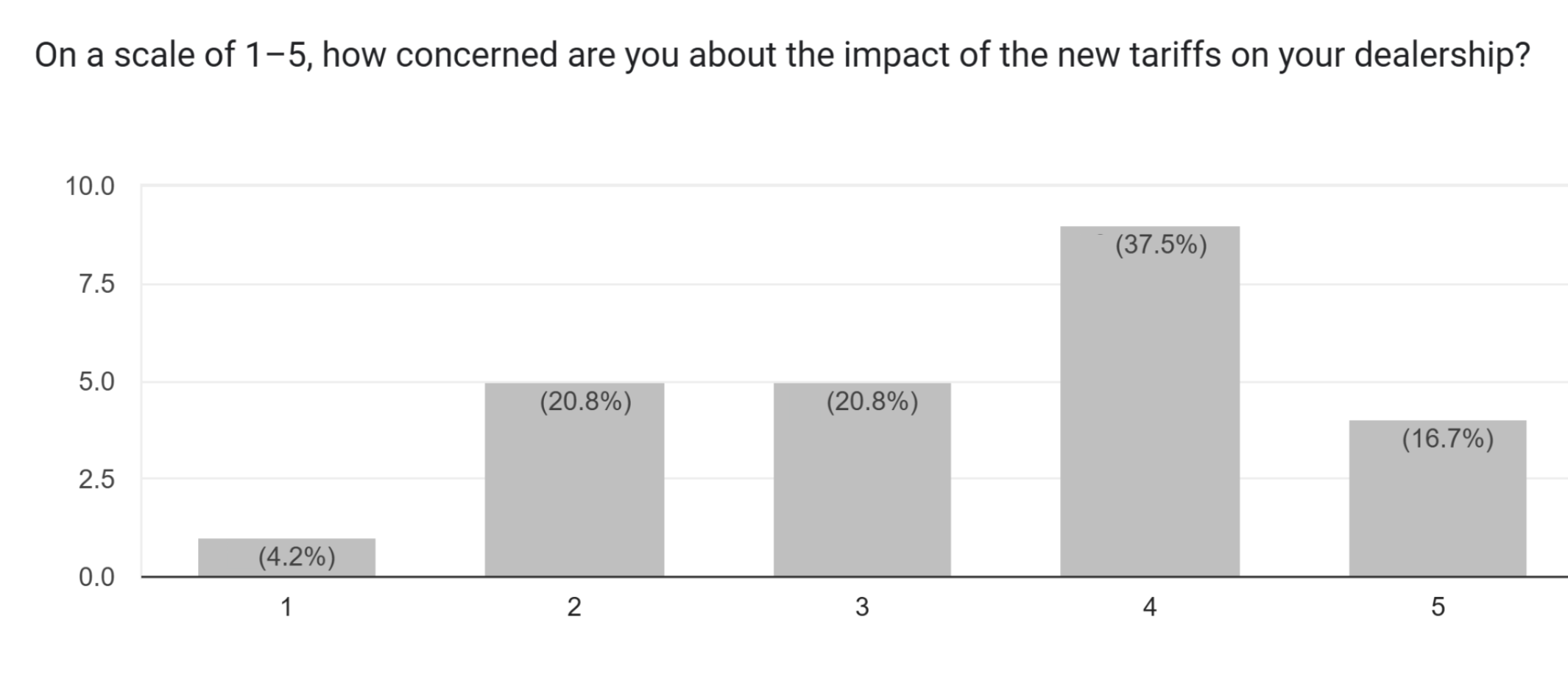
*Mean of 3.48. Margin of error at 95% confidence: ±0.46
What Dealers are Saying
“Uncertainty” seems to be the watchword here, with dealers emphasizing the hesitancy farmers face in making big financial decisions when they don’t know what policy is coming down the pike.
“Uncertainty about tariffs has been the biggest threat. Many customers are taking a more cautious approach to buying new and used equipment because they just don’t know what will happen.”
“The reality is no one knows what tariffs this administration will actually enforce and for how long. A couple of months ago, it was interpreted as a negotiation strategy (which could still be the case), but now the tariffs seem to have some real teeth.”
What will the impact on demand be for used equipment?
Dealers were more optimistic than one might expect regarding demand for used farm equipment. Over 60% of respondents said they believe the tariffs will result in either a slight or significant increase in demand. Just under a third believe demand will remain unchanged, and fewer than 10% expect demand to drop.
So why the optimism? Many dealers noted that as tariffs drive up the cost of new equipment – especially when factoring in more expensive parts and raw materials – buyers may increasingly turn to the used equipment market. With fewer farmers able or willing to absorb the rising costs of new machinery, demand could shift decisively toward used inventory.
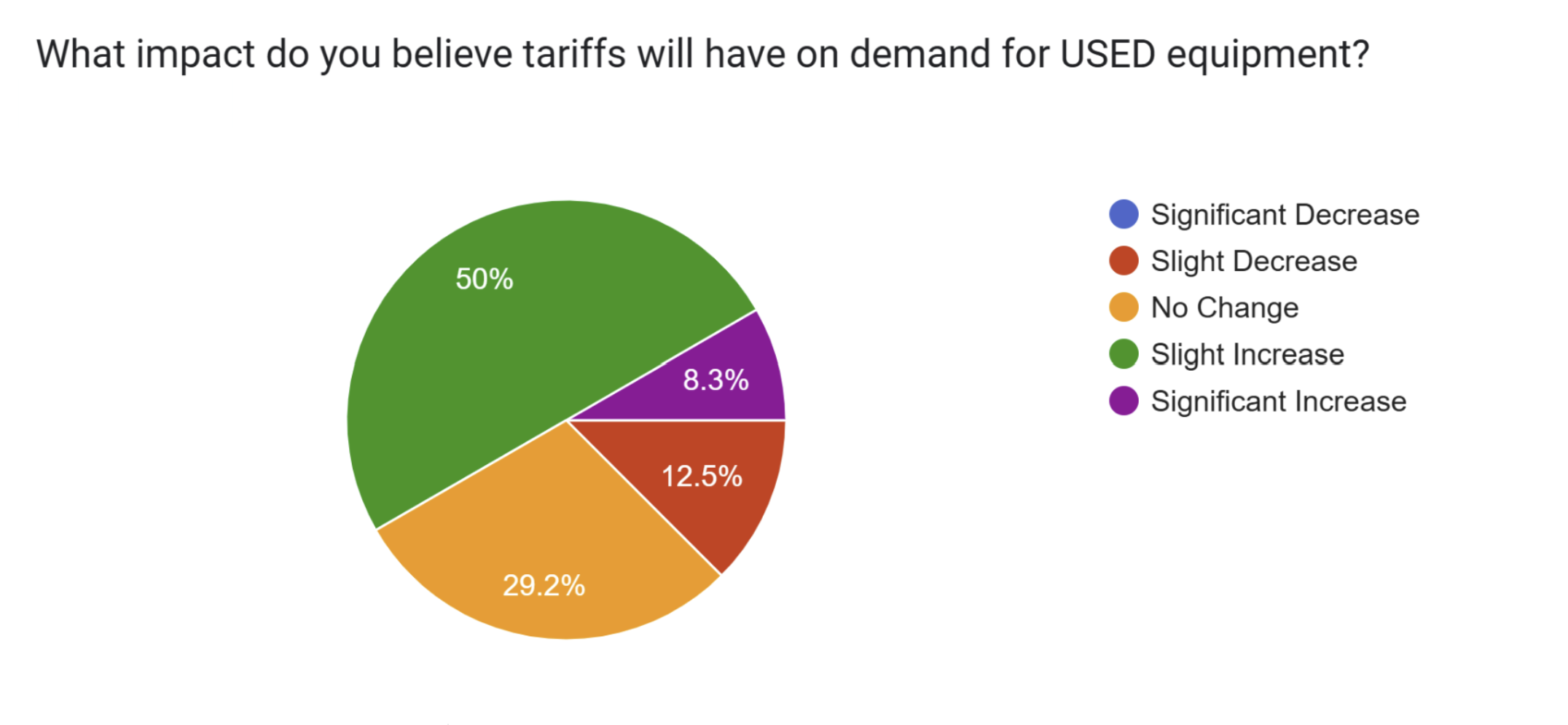
What Dealers are Saying
Dealers say tariff-driven new equipment price hikes are likely to increase demand for used equipment, but that some producers have already upgraded and may hold off further spending.
“Simply creating a general state of uncertainty – which will in turn dissuade producers from spending any money on equipment. Many producers have already upgraded in the past year or two since used equipment pricing was down, so these folks can just sit and ride this out without needing to upgrade or replace anything at present.”
“Rising prices are making the market too expensive to purchase new...It looks like used equipment will be the key driver over the next couple of years.”
Used Equipment Prices: Likely to See a Modest Increase
If that predicted boost in used equipment demand comes to pass, it could also drive up prices. Roughly 60% of respondents believe used equipment prices will rise as a direct result of the tariffs, with nearly half anticipating a slight increase. Around a quarter see no change on the horizon, while only 13% believe prices will decline.
These results reinforce the idea that used equipment may become even more valuable in an inflationary, tariff-heavy environment. If new equipment prices rise by 10% or more, as the survey speculated, over 50% of dealers expect used prices to follow suit due to increased cost pressures and elevated buyer interest.
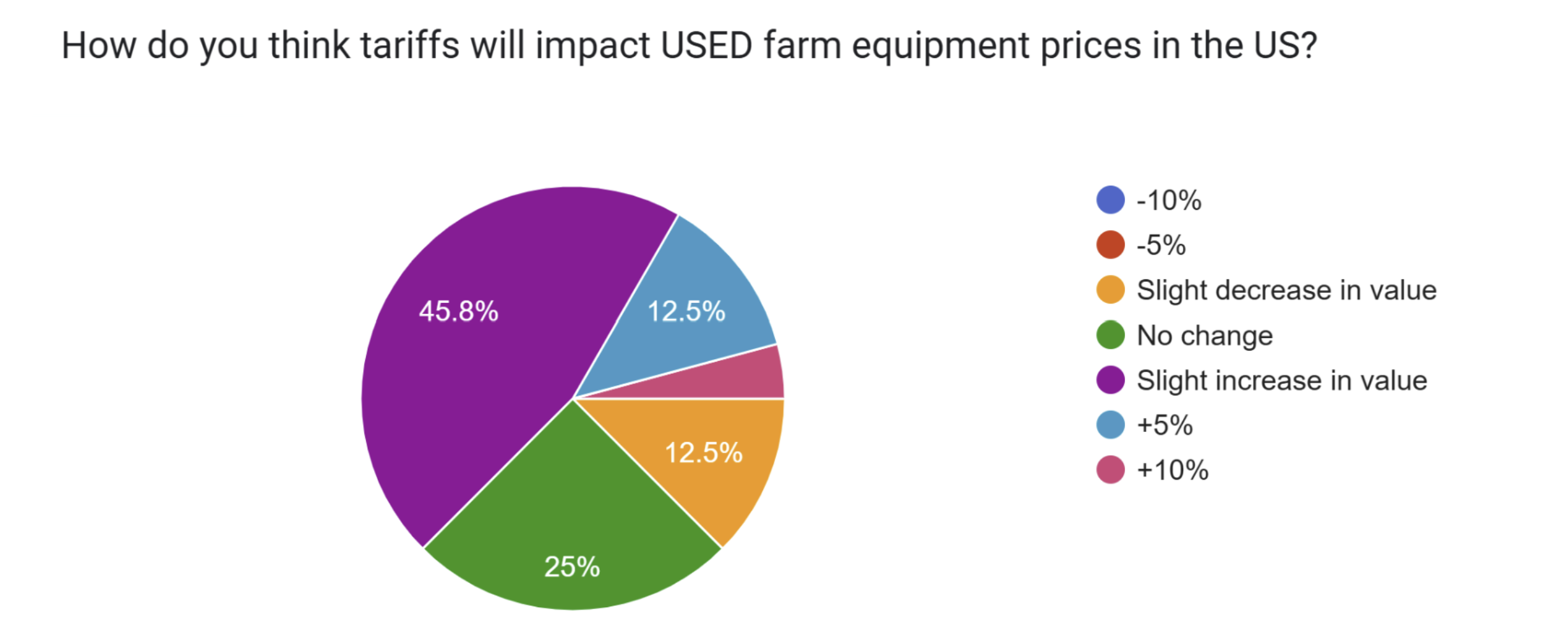
What Dealers are Saying
Most dealers say that a “slight increase” in prices is expected as used becomes a more affordable alternative to new, but some believe that other market factors may play an even greater role than the tariffs themselves.
“I think that higher interest rates and lower commodity prices play a larger role on used inventory prices than tariffs do. This will continue to be the case, with the exception of cash buyers, which are looking for real deals when choosing to pay with cash.”
Farmers May Stay on the Sidelines — for Now, at Least
Despite potential pricing shifts, several dealers believe many farmers will remain cautious in the short term. With many farm fleets younger than ever – thanks in part to forward purchases during the pandemic – and interest rates still high, farmers may delay major equipment decisions unless triggered by one of several "black swan" events.
These include a spike in a farm assistance package, commodity prices, a significantly revamped Farm Bill, or expanded Section 179 tax incentives. Barring these developments, dealers say, many farmers will continue to hold onto current equipment—keeping their "hands in their pockets" for now.
2026 Outlook: Predictions Somewhat Shaped by Dealership Roles
When asked to forecast used equipment values in 2026, over 75% of all respondents predicted at least a slight increase from 2025 levels. But the real nuance came when segmenting by dealership role.
Among owners, dealer principles and managers, an overwhelming 93% believe prices will rise next year. However, among those in sales, parts, service, and operations, that figure drops to just 60%. This discrepancy may reflect varying degrees of exposure to financial planning versus daily customer interactions, but it highlights the diversity of perspective within a single dealership.
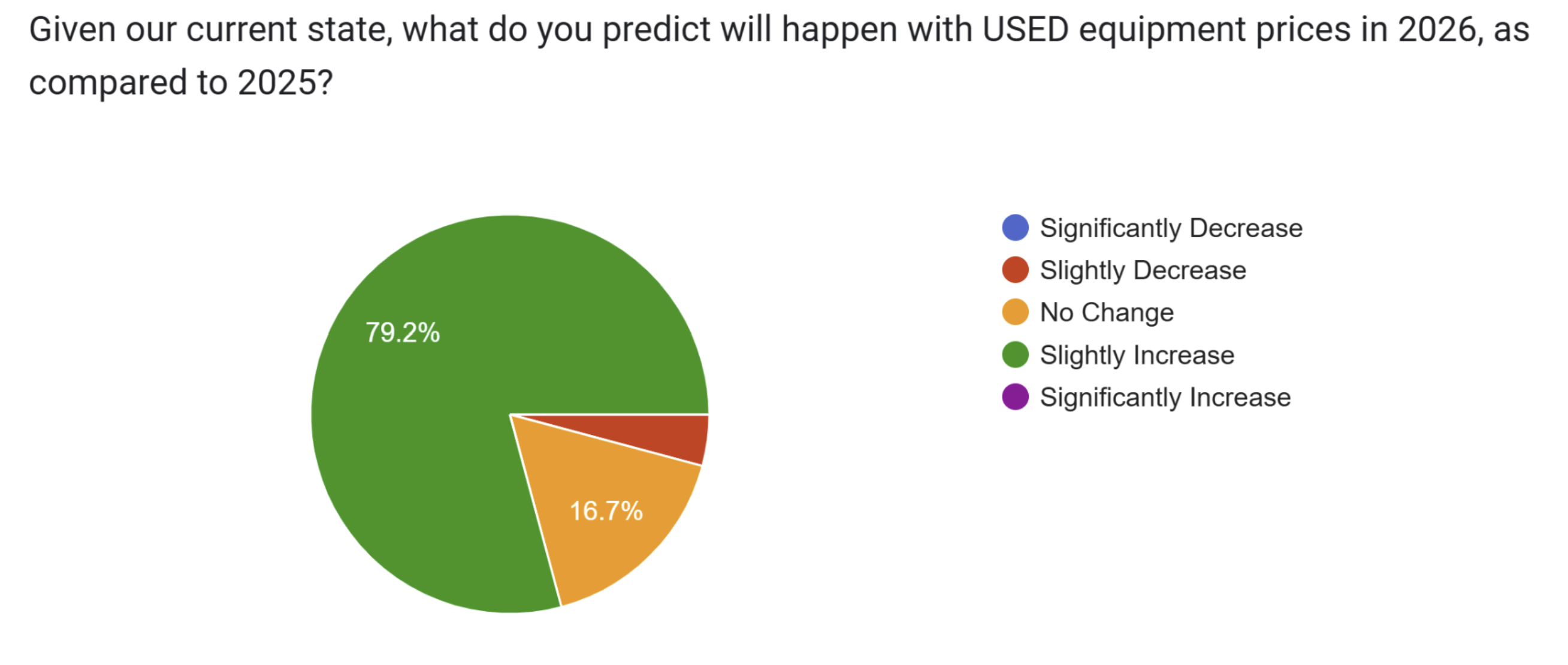
What Dealers are Saying
Dealers largely feel that, while there will likely be some (or a lot of) short-term pain for the industry at large over the tariffs, the longer-term impacts will create increased value and opportunities.
“Some producers may see an increase in the value of their commodity and others may see a reduction in value. In some cases it may be a wash. In the long run, it looks to likely have a net positive impact on agriculture and industry. But there will likely be a negative impact in the short term.”
“While I think there will be some ‘short-term pain’ from the tariffs, the 'long-term gain' will provide a huge benefit to our entire country not too far into the future. Tariffs are a useful negotiation tool, and leveling the playing field will eventually lead to national prosperity.”
Will Farmers Feel the Pinch? Dealers Say It Depends…
When asked if farmers will feel a negative impact from the tariffs, responses were nearly evenly split. About 45% said “yes,” another 45% were “unsure,” and only 9% said “no.” Geography and crop type play major roles in that assessment. For example, soybean producers—already facing steep price drops – are likely to feel more immediate pain than producers focused on domestically consumed crops.
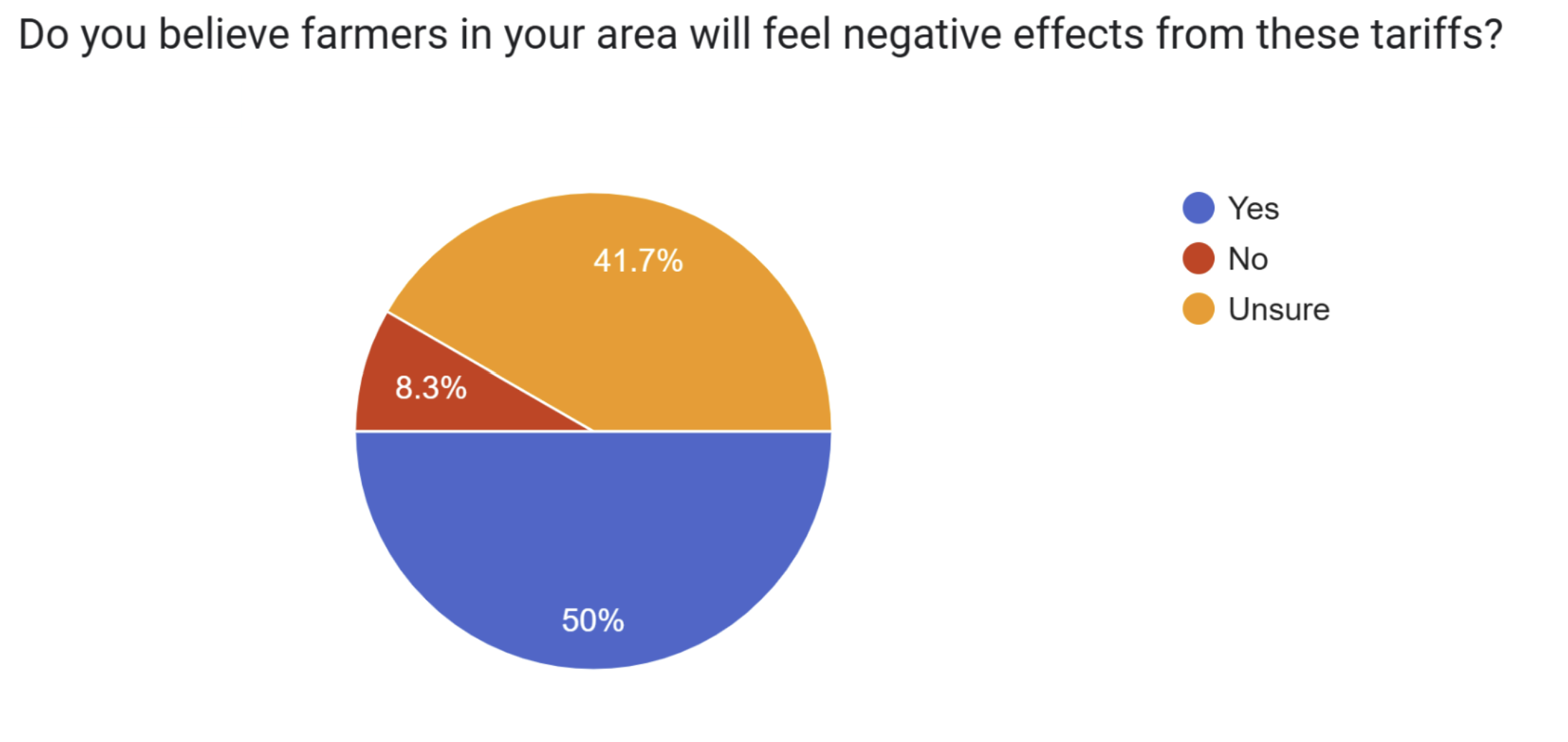
What Dealers are Saying
There is widespread concern among dealers for the immediate impact on farmers due to increased input costs (e.g., fertilizer), financial strain, and lender caution. But like most things regarding the future, nothing can be known for certain.
“Nobody can accurately predict how they are going to be affected by the tariffs, since this is a first for most of us. Bankers have already been playing defense this crop loan renewal season, and all the tariffs are going to do is keep them far away.”
“One of the largest portions of input cost for a grower is fertilizer, and most of the foreign sources of [fertilizer] are subject to the 25% tariffs. It’s going to be a bear to work that into your annual operating budget!”
“Many of our customers cannot realistically absorb these kinds of price increases, and most will not be willing to accept it.”
Final Thoughts: Staying Nimble in a Shifting Market
One of the most surprising takeaways from our dealer survey? Fewer than 5% of dealers expect a negative impact on used equipment demand, despite the major hits to manufacturers’ stock prices and a volatile commodities market.
What this suggests is a recognition that the used equipment market is deeply connected to broader economic patterns – but also resilient in its own right. Dealers know their customers, understand equipment cycles, and are preparing to stay agile in the face of uncertainty.






